E-E-A-T and main updates to Google’s high quality rater pointers
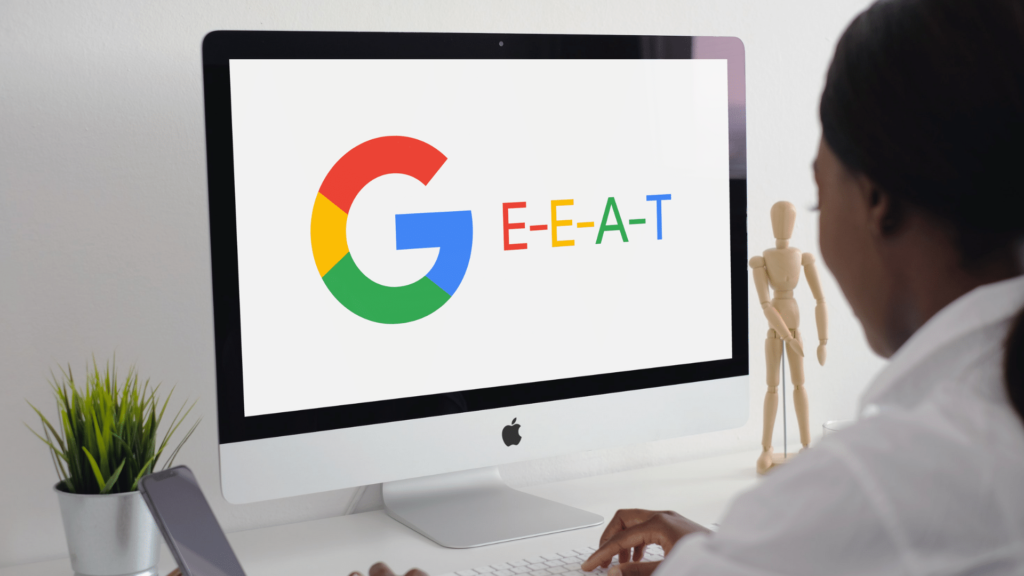
[ad_1]
Google has made vital adjustments to its High quality Rater Tips (QRG) for search.
Whereas Google updates this doc a number of instances per yr, the newest model, up to date at present, got here with notable adjustments to the construction of the doc, with many new sections and tables added and a complete of 11 new pages value of content material.
Whereas there are dozens of necessary particulars about what modified, arguably crucial change was the introduction of the letter E to the beginning of the favored acronym E-A-T.
Introducing E-E-A-T
Google is now introducing the idea of E-E-A-T, which stands for
- Expertise.
- Experience.
- Authoritativeness.
- Trustworthiness.
The addition of “expertise” signifies that content material high quality may also be evaluated by means of the lens of understanding the extent to which the content material creator has first-hand expertise within the subject.
With this reframing of E-E-A-T, Google additionally states that “belief” is on the middle of this idea and is the “most necessary member of the E-E-A-T household.”
Google additionally offers many extra clear examples of necessary ideas, similar to:
- Evaluating the status of internet sites and content material contributors.
- The extent to which E-E-A-T issues and the way it needs to be evaluated.
- What it means for content material to be dangerous.
Extra inclusive language and granularity
Google seems to be evolving its language to be extra inclusive and sustain with the instances. It added many new mentions of social media platforms, influencers, and the way content material can take totally different types, similar to video, UGC, and social media posts.
On this model, Google additionally takes a granular strategy in answering many widespread questions on how E-E-A-T works and the way a lot it issues for various matters. Google spells out what content material needs to be thought of dangerous and whether or not on a regular basis expertise is adequate to supply reliable content material for the subject at hand.
There are a lot of extra adjustments than what is printed under.
All SEOs ought to take time to learn by means of Google’s new pointers, as they function a illustration of the place Google needs its algorithms to go.
Get the each day publication search entrepreneurs depend on.
Essentially the most vital adjustments to the QRG
Beneath are a few of the most vital adjustments to the Search High quality Tips in December 2022, damaged down by part.
Understanding the Web site – Part 2.5
Google up to date its pointers round figuring out who operates an internet site. Within the new QRG, Google added the next new steerage:
“Begin by discovering out who’s accountable for the web site and who created the content material on the web page… Then, search for details about the web site and/or content material creators on the web site itself.” (web page 15)
This addition implies that it’s necessary to know who really owns and operates the web site, even when that relationship just isn’t straight clear on the positioning.
Google additionally started to check with the status of the “web site and/or content material creators” as an alternative of simply the web site, indicating that the status of the folks contributing content material to the web site must also issue into consideration when evaluating that web site.
Discovering Who’s Chargeable for the Web site and Who Created the Content material on the Web page – Part 2.5.2
When figuring out who’s accountable for an internet site, Google states it needs to be clear who owns the web site.
Within the earlier model of the QRG, Google requested raters to search for which “particular person, firm, enterprise, basis, and so on.” is accountable for the positioning.
On this model, Google changed “basis” with “group” and “authorities company.”
Google additionally added:
“…for pages on web sites similar to boards and social media platforms, folks could submit content material utilizing an alias or username so as to keep away from sharing personally identifiable info on-line. In these instances, the alias or username is a suitable solution to establish the content material creator.”
Google additionally added a model new desk to assist high quality raters establish who created the primary content material on a webpage.

This desk helps raters establish who’s accountable for the content material on varied varieties of websites, provided that some web sites completely management their very own content material, whereas others are comprised primarily of user-generated content material or contributions from authors.
Google appears to be targeted on distinguishing the web site proprietor from the content material contributor(s) on that web site.
Total Web page High quality Score – Part 3.0
Google considerably shifted across the order of a few of its recommendation associated to score web page high quality and analyzing status info.
The up to date QRG gives a brand new 3-step course of for assessing Web page High quality:
- Assessing the true objective of the web page and the way dangerous/misleading it’s
- Assessing the potential of the web page to trigger hurt or in any other case be untrustworthy or spammy
(If the rater determines the pages are dangerous, untrustworthy or spammy, they need to fee them Lowest high quality)
- If the web page just isn’t dangerous, the standard score relies on how effectively the web page achieves its objective
Google additionally added a brand new desk to think about when evaluating web page high quality:
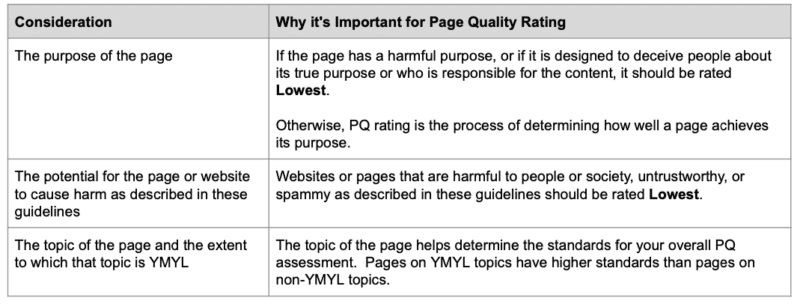

The third consideration asks the rater to think about the “extent to which the subject of the web page is YMYL.” This refers back to the spectrum of YMYL matters referenced within the earlier model (based mostly on their means to trigger hurt to the consumer).
Google launched a brand new consideration for understanding the sort of web site. A few of these issues embody whether or not the web site:
- Is a hobbyist web site or company.
- Entails monetary transactions or requires funds
- Is supported by volunteers or by professionals.
Several types of web sites have totally different web page high quality expectations
Google additionally indicated that whereas adverts are obligatory for a lot of websites to monetize, the “methods through which adverts contribute to consumer expertise” are a consideration for web page high quality.
As acknowledged in earlier sections, the status of the web site and its content material creators contributes to web page high quality.
And lastly, we now have probably the most vital reveal of the up to date High quality Rater Tips: E-E-A-T: Expertise, Experience, and Authoritativeness and Belief.
High quality of the Important Content material – 3.2
Google made some necessary adjustments to how raters ought to assess the standard of a web page’s foremost content material.
Within the earlier model (web page 24), Google acknowledged:
“For every type of webpages, creating prime quality MC takes a big quantity of not less than one of many following: time, effort, experience, and expertise/ability.”
Within the new model (web page 22), Google eliminated the phrase “time” and added the phrase “originality.”
“For many pages, the standard of the MC will be decided by the quantity of effort, originality, and expertise or ability that went into the creation of the content material.”
Given Google’s concentrate on unique content material this yr, this addition is no surprise.
Google additionally added a brand new desk to this part, outlining assess web page high quality:
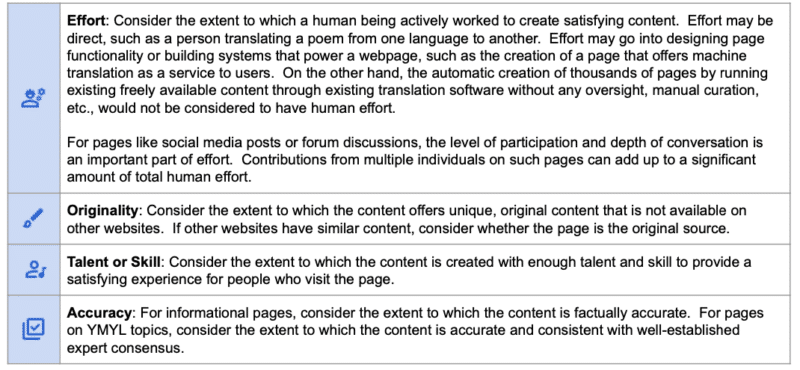
Google’s elevated concentrate on effort with a transparent rationalization of what effort seems like (and doesn’t seem like) is a giant replace to this model of the QRG.
Google appears to be asking raters to concentrate on how a lot precise work went into constructing the content material, versus techniques that use automation with out oversight or guide curation.
Google can be more and more targeted on the originality of the content material and the presence of insights not discovered elsewhere.
As with earlier variations of the QRG, Google additionally states that accuracy and alignment with skilled consensus are necessary for YMYL matters.
Repute of the Web site and Content material Creators – Part 3.3
Google enhanced its suggestions for understanding the status of each an internet site and its content material creators.
One necessary addition is that status analysis is determined by the subject of the web page content material. Google asks raters to consider the status of the content material creators “within the context of what the web page is about.”
The under paragraph is necessary for understanding this idea:

Google additionally added an necessary new element about web sites or content material creators that create content material throughout many various web sites.
In these instances, the standard rater ought to contemplate the “underlying firm or the content material creator,” which suggests they’ll look throughout totally different web sites to acquire status info.
Repute of the Content material Creators – 3.3.4
Google expanded its pointers round figuring out the status of particular person authors and content material creators.
This complete part is new and exhibits how a lot Google is concentrated on the status of particular person content material creators (they even point out influencers!):
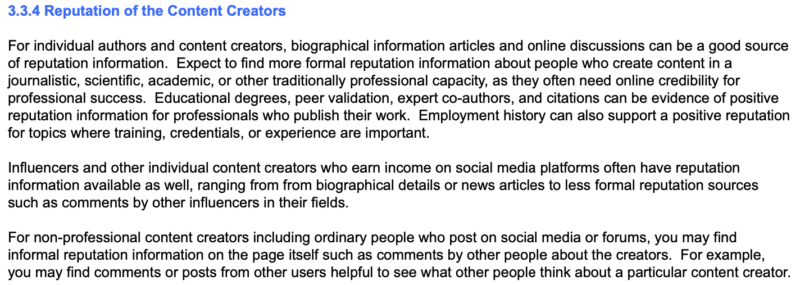
Expertise, Experience, Authoritativeness, and Belief (E-E-A-T) – Part 3.4
Google’s E-A-T has been a sizzling subject within the search engine optimization neighborhood for the previous few years. This model of the High quality Rater Tips introduces a brand new, advanced model of E-A-T:
E-E-A-T: Expertise, Experience, Authority and Belief
Together with introducing an additional letter – E for expertise – Google now additionally locations “belief” on the middle of this ‘household’ of necessary issues for web page high quality.
Based on Google (web page 27):
“Belief is crucial member of the E-E-A-T household as a result of untrustworthy pages have low E-E-A-T irrespective of how Skilled, Knowledgeable, or Authoritative they could appear.”
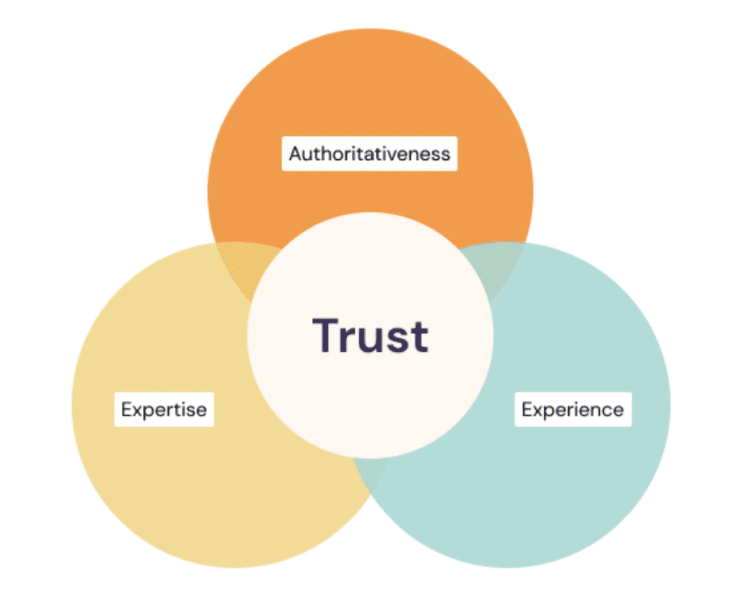
Belief is the mechanism by which raters decide if the web page is “correct, sincere, secure, and dependable” (web page 27). The quantity of belief a web page requires relies upon completely on the character of the web page.
Google offers the instance of on-line shops, which require safe on-line fee techniques and good customer support. It additionally mentions product evaluation websites – a reliable evaluation would assist searchers make knowledgeable choices fairly than simply attempt to promote the product.
Google launched a brand new desk to assist raters perceive strategy expertise, experience and authoritativeness:
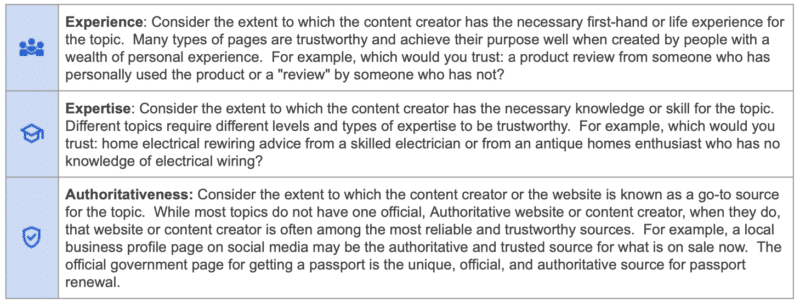
The introduction of “expertise” to the idea of E-A-T is in keeping with a lot of Google’s updates and communications all through the previous couple of years, significantly associated to product evaluation content material.
Google focuses on the extent to which content material creators have “obligatory first-hand of life expertise for the subject.” Having vital expertise lends itself to belief.
Google makes use of the instance of a product evaluation – somebody who has personally used the product has extra expertise than somebody who has not, subsequently creating extra belief.
For evaluating Belief, crucial “member of the E-E-A-T household,” raters ought to contemplate:
- What the web site says about itself on its About Web page or different profile pages.
- What others say in regards to the web site or its content material creators (third-party evaluations or references).
- What’s seen on the web page – precise proof on the web page that the content material creator will be trusted (e.g., actual proof of them doing the factor they declare to be an skilled in).
Google additionally provides a brand new necessary element about conflicts of curiosity. A evaluation by the product producer just isn’t reliable, neither is the evaluation of an influencer paid to advertise the product.
YMYL Matters: Expertise or Experience? – 3.4.1
Google launched a brand new desk to differentiate when Expertise or Experience is required for YMYL content material. This desk goals to reply whether or not on a regular basis expertise or precise experience is required for varied matters, similar to medical circumstances, voting, and saving for retirement:

This new part signifies that simply because a content material contributor just isn’t a bonafide skilled on a YMYL subject, this doesn’t make the content material inherently untrustworthy.
Folks sharing their tales based mostly on first-hand expertise will be thought of reliable content material in sure conditions.
Dangerous to Self or Different People – Part 4.2
Within the earlier model of the QRG, Google launched the notion that YMYL matters are decided based mostly on their means to trigger hurt to the consumer.
On this new model, Google supplied an in depth desk with examples of what’s thought of dangerous or not:
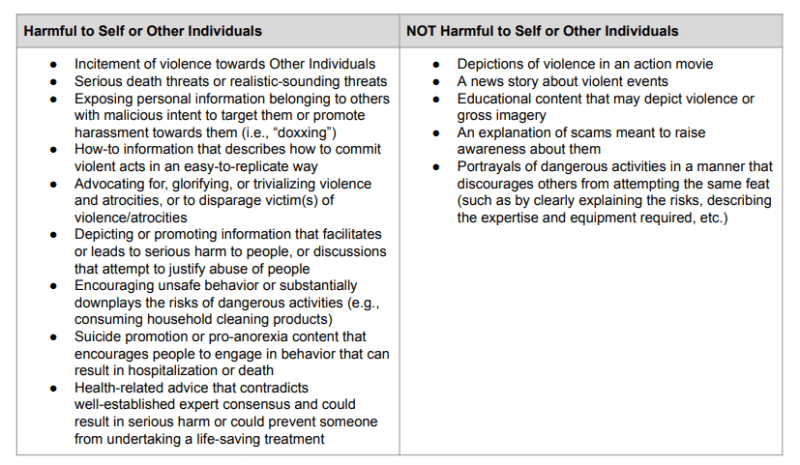
And the same desk explaining what it means for content material to be dangerous to teams:

These nuances are attention-grabbing, given a lot of the general public discourse about freedom of speech throughout varied social platforms in 2022.
Google seems to be drawing a transparent line between free speech and violent/harassment speech in its definition of dangerous content material.
Google additionally offers clear examples of “harmfully deceptive info,” together with a number of widespread web conspiracy theories which might be both clearly inaccurate, contradict well-established skilled consensus, or are unsubstantiated:

Missing E-E-A-T – Part 5.1
Google offers examples of what it seems prefer to lack an acceptable stage of E-E-A-T for the subject or objective of the web page. These are the examples supplied (web page 51):
- “The content material creator lacks ample expertise, e.g. a restaurant evaluation written by somebody who has by no means eaten on the restaurant
- The content material creator lacks ample experience, e.g. an article about skydive written by somebody with no experience within the topic
- The web site or content material creator just isn’t an authoritative or reliable supply for the subject of the web page, e.g. tax type downloads supplied on a cooking web site.
- The web page or web site just isn’t reliable for its objective, e.g. a procuring web page with minimal customer support info”
These examples assist conceptualize the distinct roles that every letter in E-E-A-T play in evaluating the web page high quality.
Language updates all through the doc
All through the doc, Google seems to be enhancing its language to be extra inclusive, similar to altering “webmaster” to “web site homeowners” and eradicating some gendered pronouns (“himself/herself” turns into “themself”).
Take note of the place Google goes with the QRG
The High quality Rater Tips are an important doc for anybody who works in search advertising as a result of they offer us a guidebook for the place Google needs its algorithms to go.
Studying between the traces of the language on this doc can assist inform what Google is on the lookout for when it comes to content material high quality, consumer expertise, and E-E-A-T of internet sites.
Following these pointers will assist guarantee your web site and firm can obtain visibility in Google search and, ideally, not be negatively impacted by any of their algorithm updates or different penalties.
Opinions expressed on this article are these of the visitor creator and never essentially Search Engine Land. Employees authors are listed right here.
New on Search Engine Land
[ad_2]
Source_link







